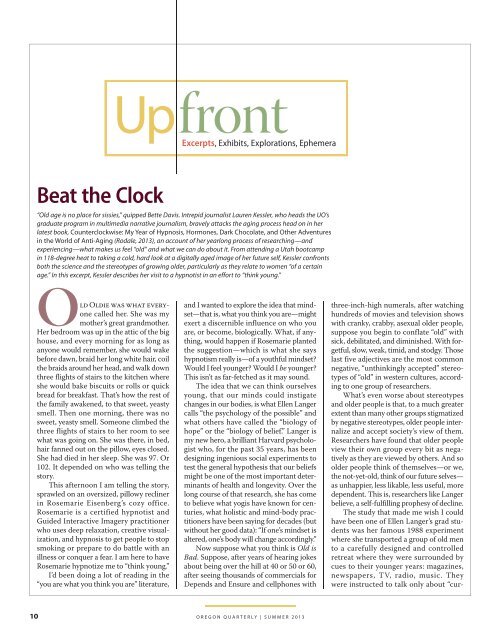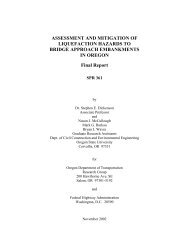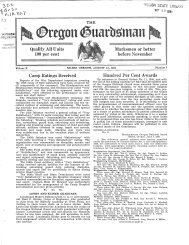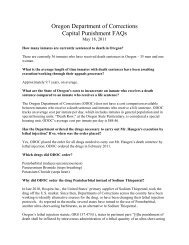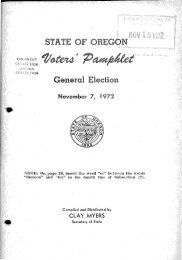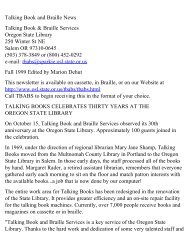Summer 2013 - Oregon State Library: State Employee Information ...
Summer 2013 - Oregon State Library: State Employee Information ...
Summer 2013 - Oregon State Library: State Employee Information ...
Create successful ePaper yourself
Turn your PDF publications into a flip-book with our unique Google optimized e-Paper software.
Beat the Clock<br />
“Old age is no place for sissies,” quipped Bette Davis. Intrepid journalist Lauren Kessler, who heads the UO’s<br />
graduate program in multimedia narrative journalism, bravely attacks the aging process head on in her<br />
latest book, Counterclockwise: My Year of Hypnosis, Hormones, Dark Chocolate, and Other Adventures<br />
in the World of Anti-Aging (Rodale, <strong>2013</strong>), an account of her yearlong process of researching—and<br />
experiencing—what makes us feel “old” and what we can do about it. From attending a Utah bootcamp<br />
in 118-degree heat to taking a cold, hard look at a digitally aged image of her future self, Kessler confronts<br />
both the science and the stereotypes of growing older, particularly as they relate to women “of a certain<br />
age.” In this excerpt, Kessler describes her visit to a hypnotist in an effort to “think young.”<br />
OLD OLDIE WAS WHAT EVERYone<br />
called her. She was my<br />
mother’s great grandmother.<br />
Her bedroom was up in the attic of the big<br />
house, and every morning for as long as<br />
anyone would remember, she would wake<br />
before dawn, braid her long white hair, coil<br />
the braids around her head, and walk down<br />
three flights of stairs to the kitchen where<br />
she would bake biscuits or rolls or quick<br />
bread for breakfast. That’s how the rest of<br />
the family awakened, to that sweet, yeasty<br />
smell. Then one morning, there was no<br />
sweet, yeasty smell. Someone climbed the<br />
three flights of stairs to her room to see<br />
what was going on. She was there, in bed,<br />
hair fanned out on the pillow, eyes closed.<br />
She had died in her sleep. She was 97. Or<br />
102. It depended on who was telling the<br />
story.<br />
This afternoon I am telling the story,<br />
sprawled on an oversized, pillowy recliner<br />
in Rosemarie Eisenberg’s cozy office.<br />
Rosemarie is a certified hypnotist and<br />
Guided Interactive Imagery practitioner<br />
who uses deep relaxation, creative visualization,<br />
and hypnosis to get people to stop<br />
smoking or prepare to do battle with an<br />
illness or conquer a fear. I am here to have<br />
Rosemarie hypnotize me to “think young.”<br />
I’d been doing a lot of reading in the<br />
“you are what you think you are” literature,<br />
and I wanted to explore the idea that mindset—that<br />
is, what you think you are—might<br />
exert a discernible influence on who you<br />
are, or become, biologically. What, if anything,<br />
would happen if Rosemarie planted<br />
the suggestion—which is what she says<br />
hypnotism really is—of a youthful mindset?<br />
Would I feel younger? Would I be younger?<br />
This isn’t as far-fetched as it may sound.<br />
The idea that we can think ourselves<br />
young, that our minds could instigate<br />
changes in our bodies, is what Ellen Langer<br />
calls “the psychology of the possible” and<br />
what others have called the “biology of<br />
hope” or the “biology of belief.” Langer is<br />
my new hero, a brilliant Harvard psychologist<br />
who, for the past 35 years, has been<br />
designing ingenious social experiments to<br />
test the general hypothesis that our beliefs<br />
might be one of the most important determinants<br />
of health and longevity. Over the<br />
long course of that research, she has come<br />
to believe what yogis have known for centuries,<br />
what holistic and mind-body practitioners<br />
have been saying for decades (but<br />
without her good data): “If one’s mindset is<br />
altered, one’s body will change accordingly.”<br />
Now suppose what you think is Old is<br />
Bad. Suppose, after years of hearing jokes<br />
about being over the hill at 40 or 50 or 60,<br />
after seeing thousands of commercials for<br />
Depends and Ensure and cellphones with<br />
three-inch-high numerals, after watching<br />
hundreds of movies and television shows<br />
with cranky, crabby, asexual older people,<br />
suppose you begin to conflate “old” with<br />
sick, debilitated, and diminished. With forgetful,<br />
slow, weak, timid, and stodgy. Those<br />
last five adjectives are the most common<br />
negative, “unthinkingly accepted” stereotypes<br />
of “old” in western cultures, according<br />
to one group of researchers.<br />
What’s even worse about stereotypes<br />
and older people is that, to a much greater<br />
extent than many other groups stigmatized<br />
by negative stereotypes, older people internalize<br />
and accept society’s view of them.<br />
Researchers have found that older people<br />
view their own group every bit as negatively<br />
as they are viewed by others. And so<br />
older people think of themselves—or we,<br />
the not-yet-old, think of our future selves—<br />
as unhappier, less likable, less useful, more<br />
dependent. This is, researchers like Langer<br />
believe, a self-fulfilling prophesy of decline.<br />
The study that made me wish I could<br />
have been one of Ellen Langer’s grad students<br />
was her famous 1988 experiment<br />
where she transported a group of old men<br />
to a carefully designed and controlled<br />
retreat where they were surrounded by<br />
cues to their younger years: magazines,<br />
newspapers, TV, radio, music. They<br />
were instructed to talk only about “cur-<br />
10 OREGON QUARTERLY | SUMMER <strong>2013</strong>


